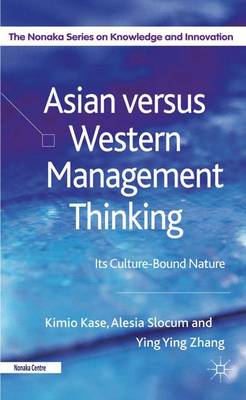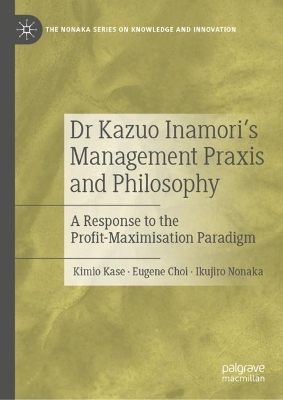The Nonaka Series on Knowledge and Innovation
4 total works
In recognition of Professor Ikujiro Nonaka's contribution to the field of Knowledge Management this book, forming part of The Nonaka Series on Knowledge and Innovation from Palgrave Macmillan, deals with a variety of aspects of the Knowledge Management (KM) theory and the knowledge-based view of the firm.
Asian versus Western Management Thinking
by Kimio Kase, Alesia Slocum, and Yingying Zhang
Published 9 August 2011
'Navigating paradigm changes is a critical element of business
leadership: analog to digital; brand to retailer to consumer; reason
to emotion; West to East. Anything that illuminates these
powershifts is valuable for the fast-moving decision-maker, and
in this respect Asian versus Western Management Thinking is a
first-rate inquiry into cultural business behaviors. Insular frameworks
of thinking and action matter less by the second. I'm an
And/And practitioner and my experience of bridging business
between East and West, and vice versa, suggests we need to
know the human distinctions that matter and the harmonies
that will matter even more. Between the covers of this book by
Kimio Kase and colleagues, business moves forward.'
Kevin Roberts, CEO Worldwide, Saatchi & Saatchi, Lovemarks Company
'Having lived and worked my entire life in various countries
around the world, I agree with the authors' premise that Asians
and Westerners often approach business problems from different
angles. Rather than focusing on differences, I welcome the
strength that comes from diversity. As my experience at
Renault and Nissan has demonstrated, the richest solutions
come when ideas are challenged or questioned by people who
have a different perspective. This book illustrates the value of
accepting diverging ideas as a fact of life that can be used to
enhance the world in which we all live and work.'
Carlos Ghosn, Chairman and Chief Executive Officer, Renault-Nissan Alliance
'A most welcome addition to the unbalanced management
literature about the 'analytical' West and the 'synthetic' East.
For too long the field has been dominated by comparisons of
cultural value systems which paradoxically tell us precious little
about how habits of mind influence management thinking and
practice in different parts of the world over time. At a time
when the world's economic centre of gravity is visibly shifting
to Asia, this really is a most timely book.'
Nigel Holden, Visiting Research Fellow at the Centre for International Business at the University of Leeds, UK
leadership: analog to digital; brand to retailer to consumer; reason
to emotion; West to East. Anything that illuminates these
powershifts is valuable for the fast-moving decision-maker, and
in this respect Asian versus Western Management Thinking is a
first-rate inquiry into cultural business behaviors. Insular frameworks
of thinking and action matter less by the second. I'm an
And/And practitioner and my experience of bridging business
between East and West, and vice versa, suggests we need to
know the human distinctions that matter and the harmonies
that will matter even more. Between the covers of this book by
Kimio Kase and colleagues, business moves forward.'
Kevin Roberts, CEO Worldwide, Saatchi & Saatchi, Lovemarks Company
'Having lived and worked my entire life in various countries
around the world, I agree with the authors' premise that Asians
and Westerners often approach business problems from different
angles. Rather than focusing on differences, I welcome the
strength that comes from diversity. As my experience at
Renault and Nissan has demonstrated, the richest solutions
come when ideas are challenged or questioned by people who
have a different perspective. This book illustrates the value of
accepting diverging ideas as a fact of life that can be used to
enhance the world in which we all live and work.'
Carlos Ghosn, Chairman and Chief Executive Officer, Renault-Nissan Alliance
'A most welcome addition to the unbalanced management
literature about the 'analytical' West and the 'synthetic' East.
For too long the field has been dominated by comparisons of
cultural value systems which paradoxically tell us precious little
about how habits of mind influence management thinking and
practice in different parts of the world over time. At a time
when the world's economic centre of gravity is visibly shifting
to Asia, this really is a most timely book.'
Nigel Holden, Visiting Research Fellow at the Centre for International Business at the University of Leeds, UK
Phronesis and Quiddity in Management
by K. Kase, I. Nonaka, C. Gonzalez Canton, and Cesar Gonzalez Canton
Published 14 January 2014
Phronesis and Quiddity in Management addresses the issue of the excellence in judgment-making, its concept and characterisation. This book investigates first into what constitutes excellent managerial skills centred on leadership revolving around judgement-making (rather than decision-making) and second into whether they can be taught.
Dr Kazuo Inamori’s Management Praxis and Philosophy
by Kimio Kase and Eugene Choi
Published 31 August 2022
This book offers a meditation on the links between philosophy and its implementation, interpreting why and how a leader's "philosophy" strengthens his action predicated on the purposeful vision of life; and discusses the a hypothesis that performance control in management may be driven by transcendental and intrinsic motivations, contrasting with the traditional management control theory. It construes how Inamori's management philosophy disciplines accounting and finance management towards putting its basic tenets into practice. Examining, in particular, the history of Kyocera, the authors provide a contemplative look at a human centric philosophy, which will be of interest to scholars of management, corporate executives, and economists with a philosophical bent.



